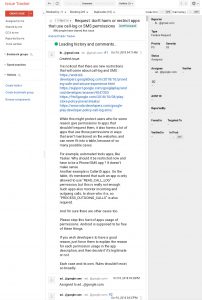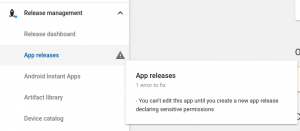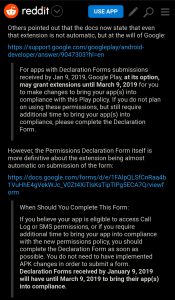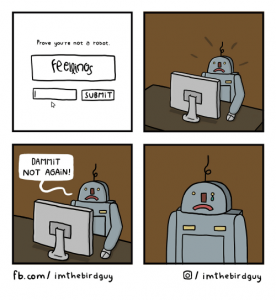The openness of Android's API makes it possible for companies like Facebook to read call log and SMS messages, if they want to
— Jane Manchun Wong (@wongmjane) December 5, 2018
Not on iOS, this is programmatically impossible for them to do so, since the lack of the similar API on iOS pic.twitter.com/np2gHKpjfz
Compared to Apple’s iOS, Android is much more open and developer friendly. Google offers a large set of APIs for developers which are really useful to add handy functionalities in their apps.
Moreover, it’s actually possible to access various segments of the underlying operating system and bring new features that are not natively supported by Android. Tasker, the famous automation app, is probably the most prominent example of it.
There is another side of the story. The same set of rich APIs can be abused by rogue developers and large corporations to steal private data, if not monitored properly.
Fortunately, Google is aware of those loopholes and trying to close them in a strict way. In a previous article, we discussed about Google’s recent crackdown policy against the potential maltreatment of SMS and call log access.
We also highlighted the quiet removal of such permissions in recent versions of Facebook apps.
Facebook for Android no longer collects text messages
— Jane Manchun Wong (@wongmjane) February 14, 2019
The app no longer contains the code that touches SMS, hence no longer asks for such permission
Well, there are unwanted side effects. Google is trying to solve the problem by extensive use of bots, which is certainly useful to reduce man-hours. But this practice is not capable enough to handle the exceptions.
For example, the new policy states that only the default phone and SMS apps should have full access to call log and text messages respectively. Third party apps, such as call recorders or SMS backup apps are thereby made crippled and starting to lose fundamental utilities.

Google did create an explanation form for developers, but the method was not enough to handle the clumsy situation.
After a huge setback, Google added task automation apps as an exception. Developers thought to take the opportunity to reinstate their apps, but that was not easy.

The fiasco became convoluted, as the deadline was vaguely extended until Mar 9, 2019 from Jan 9, 2019.
For apps with Declaration Forms previously submitted, Google Play, at its discretion, may grant extensions until March 9, 2019 for you to bring your app(s) into compliance with this Play policy.
(Source)

The latest victim of this catastrophe is ODK Collect. The app is a part of Open Data Kit initiative.
The Open Data Kit community produces free and open-source software for collecting, managing, and using data in resource-constrained environments.
The service and the corresponding app are used by emergency responders and volunteers across the world to collect field data in the absence of cellular data. SMS fallback is a vital parameter for the app to function properly in areas like rural Somalia, where WHO is working on polio vaccination.
The round will be supported by around 3,500 personnel including vaccinators, social mobilizers, monitors and supervisors. To help provide accurate, timely, and comprehensive information about vaccination activities, Open Data Kit (ODK) mobile data collection tools have been developed and will be put to use. More than 200 supervisors and monitors have been trained on the data collection platform.
Yaw Anokwa, the founder of Open Data Kit, has commented that Google’s strict guideline will hamper the whole operation: “No SMS makes the process a lot harder and costlier.”.
It’s a very frustrating change for those of us who use SMS as transport for humanitarian data. It will make it harder to eradicate polio.
— Yaw Anokwa, PhD (@yanokwa) February 19, 2019
At @OpenDataKit, SMS lets folks at WHO in places without 2G send in reports to ensure vaccination coverage is sufficient while the immunizers are there. We are talking ~1M kids in places like Somalia. https://t.co/VGkfi8LyxI. No SMS makes the process a lot harder and costlier.
— Yaw Anokwa, PhD (@yanokwa) February 19, 2019
Anokwa started ODK while doing internship under Google, so he believes that Google may create another exception for humanitarian apps.
We’ve requested a category for humanitarian apps and have asked our internal supporters to advocate for that. Been weeks and not looking good...
— Yaw Anokwa, PhD (@yanokwa) February 20, 2019
Even after weeks, Google has not sent a proper reply. Several other app developers are circling around Google’s bot responders while the deadline is nearing by.
We need to get in touch with someone on the Play Store team who can help us resolve a problem. After more than 65 days, we are stuck in a feedback loop and it's getting harder to ship Signal updates. Are you a human at Google? Please email us here: [email protected]
— Signal (@signalapp) February 19, 2019
Reader may recall the incident where Google terminated a new business by banning their Play Store developer account.
Google terminated our business via our Google Play Developer Account https://t.co/mkL3H4xzks
— Hacker News (@newsycombinator) February 10, 2019
After the story went viral, Google manually reviewed their applications and restored the app. The owner wrote the following after the restoration:
Google — please look at your account developer review policies and introduce a more in-depth human element to appeals. I appreciate you must have to terminate many accounts every day, the vast majority of which will be justified. But equally there are accounts where developers have made genuine mistakes or Google bots have made unfair links that cause developer accounts to be unfairly terminated.
We hope that the apps which are actually worthy will get the same treatment from Google… from human employees!
How did you reach out? We haven't seen anything new.
— Signal (@signalapp) February 20, 2019
Quoting a redditor:
Left in the hands of bots (and AI), the behavior of a company can become indistinguishable from a huge bureaucracy.
(Source)

PiunikaWeb is a unique initiative that mainly focuses on investigative journalism. This means we do a lot of hard work to come up with news stories that are either ‘exclusive,’ ‘breaking,’ or ‘curated’ in nature. Perhaps that’s the reason our work has been picked by the likes of Forbes, Foxnews, Gizmodo, TechCrunch, Engadget, The Verge, Macrumors, and more. Do take a tour of our website to get a feel of our work. And if you like what we do, stay connected with us on Twitter (@PiunikaWeb) and other social media channels to receive timely updates on stories we publish.


